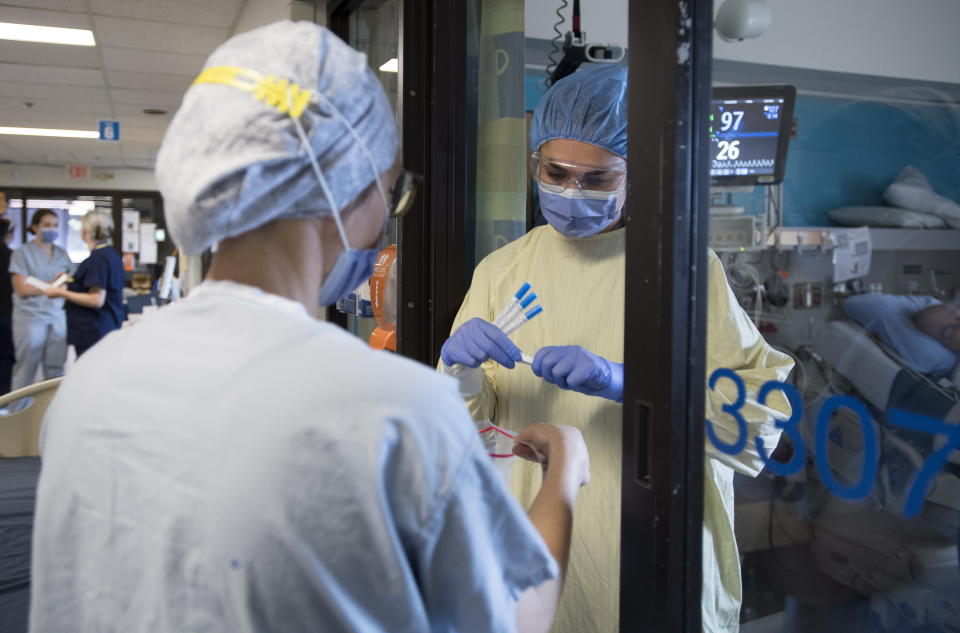'There are ramifications beyond COVID patients': Alberta doctor explains how the pandemic impacts all health care
As healthcare workers in Canada remain on the frontline of the COVID-19 pandemic, the impact of the spread of the virus goes far beyond those infected.
“There are ramifications beyond COVID patients, everybody is suffering,” Dr, Amy Tan, associate professor at the University of Calgary at palliative care doctor, told Yahoo Canada. “I’m in my second decade of practice...it has been unlike anything we’ve ever experienced before.”
As Dr. Tan continues to see patients throughout this pandemic, she is navigating how to provide essential care with the public health measures in place, while keeping herself and her patients safe.
“I’ve had to do some very difficult things, like break the news of diagnosing a new cancer over the phone,” Dr. Tan said. “I felt so helpless when somebody was on the phone sobbing, and not being able to use my humanity and my physical touch to help comfort somebody.”
“I have to say that’s been the hardest thing in the last month for a medical issue that wasn’t directly related to COVID-19, but shows that COVID-19 is affecting all medical care."
‘They need their non-COVID issues managed too’
Although COVID-19 is of primary importance during this time, there are still a number of people, in Calgary and across the country, who need to have their non-COVD-19 medical conditions managed.
“We really need to weigh the risks and balances of having people with pre-existing conditions come into the clinic and potentially expose themselves, so we’re trying to do most things virtually to keep them safe,” Dr. Tan said. “That’s a huge concern of ours. But they need their non-COVID issues managed too during this.”
On Tuesday, Deputy Premier of Ontario and Minister of Health Christine Elliott, said in a press conference that a recent report from University Health Network (UHN) indicates 35 people with cardiac conditions may have died due to their surgeries being postponed during the pandemic.
Doctors and other medical professionals have had to make significant changes to their practices during the COVID-19 pandemic. With the move to less in-person medical care, Dr. Tan has recognized that the lack of physical visibility has impacted how she treats and effectively communicates with patients.
“I never appreciated how much I relied on visual cues in my assessments with patients,...the number of questions and how you phrase things has been really, much more difficult and time-consuming than I think we anticipated, now that we’re doing most of our visits by phone,” Dr. Tan said.
This becomes increasingly more difficult for individuals who do not have extensive technological or internet knowledge and capabilities, particularly more elderly populations, which means doctors must mostly rely on phone calls.
“While there are parameters and principles that we are relying on in our training, it has absolutely been emotionally and physically, and psychologically exhausting to learn about this new disease, what it can do to patients, how the information is so quickly evolving and having fear and anxiety for our patients, and ourselves as well,” Dr. Tan said.

Calls for adequate equipment continues
Throughout the COVID-19 pandemic in Canada, there have been calls for more personal protective equipment (PPE) across the country. The federal government has revealed a variety of “challenges” with getting this equipment from international markets, particularly with global demand for these products.
Earlier this month, it was revealed that one million face masks imported from China were inadequate for health-care workers.
Although these acquisition efforts have continued, a number of frontline workers, in various provinces, have expressed concerns about having an adequate supply of quality PPE to keep them safe.
According to a poll conducted by the Canadian Medical Association (CMA) on Apr. 20 to 21, close to 90 per cent of respondents indicated that a greater availability of PPE would help ease their concerns.
“Ensuring that we have adequate quality, effective PPE is of utmost importance,” Dr. Tan said.

